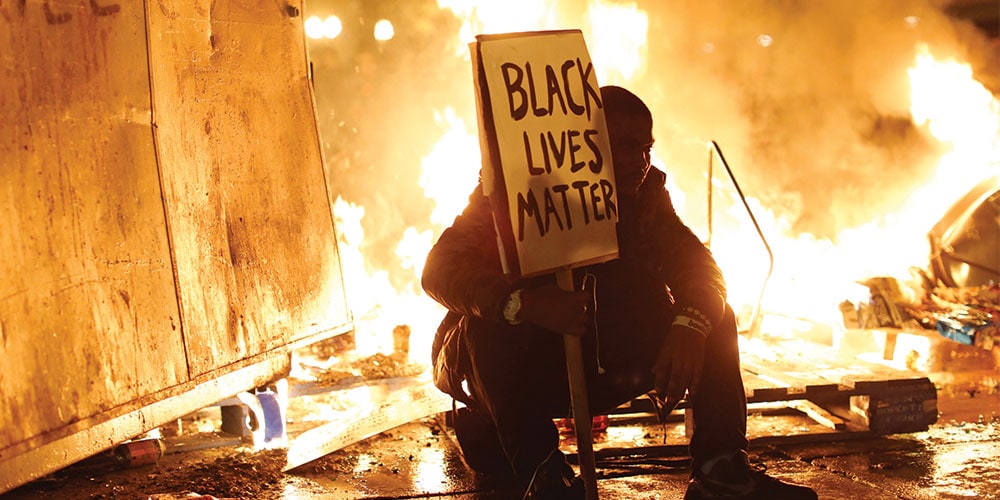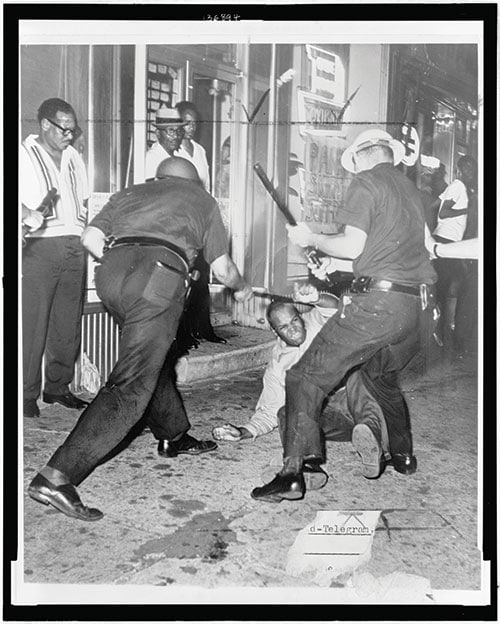
Of course they matter—Black lives do—to God. So what? All life matters to God. God loves the world, says the theme text of the gospel. He loves the world so much “that he gave his only begotten Son” (John 3:16)1 to save whoever believes. Which is to say that all of us always have mattered and still so matter to God that He gave His Son’s life for our life! Life matters to God.
We could close here, perhaps. But stay with me, and let’s unpack this idea about Black lives mattering. You, the reader, do not need this article to rehearse the events from Ferguson to Chicago, and all the rest in between that seem to send the message that maybe some lives are not, to some, as valuable as other lives. Unfortunately, as soon as this observation is made, there is an immediate defensiveness on the part of some, and even aggressive reaction on the part of others.
Then there is that group in between that just wonders out loud, “Why are we talking about this, writing about this?” The issue eventually becomes racial, and thus, for many, uniquely bothersome, perhaps nowhere more than in the United States of America, where, despite everyone’s legal equality, progress on issues of “heart” unity has been painfully slow.
Devaluing human life was an early demonstration of humanity’s sin problem, rudely showing up in the second generation where “Cain rose up against Abel his brother and killed him” (Gen. 4:8, NKJV).2 “When Cain, moved by the spirit of the wicked one, saw that he could not control Abel, he was so enraged that he destroyed his life.”3 The word “control” is important, specifically in context of incidents of violence by one human on another that emphasize the high risk of nonconformity.
By the time of the worldwide flood, the Genesis record is that “the earth was filled with violence” (Gen. 6:11). In the 10 generations from Adam to Noah there occurred a conspicuous devaluing of life. Lamech’s victim (Gen. 4:23) may have resisted his assault. Lamech claims that he wounded him. Nevertheless, the end result of that encounter, as of too many others, was loss of life.
The increasing diversity recorded from Genesis 6 through 11 that today manifests itself as a variety of language, national, and economic groups has generated its multitude of classes, cultures, nations, tribes, and economic strata with deeply held convictions of relative value. And it all started with Adam’s devaluing. If that thought surprises you, Scripture offers Genesis 3:12: “The woman whom thou gavest to be with me, she gave me of the tree, and I did eat.” If You, God, must deal with someone, let it be her, not me.
Adam’s position set the stage for human existence. Micah 6:7 highlights both the truth and horror of the societal norm of rating the value of one life against another: “Shall I give my firstbornfor my transgression, the fruit of my bodyfor the sin of my soul?” By the same token that the firstborn may be most valued, the later born stand as less valued. Scales have valued sons over daughters, or a spouse over children, relatives over strangers, and fellow citizens over foreigners. The underlying principle for preference has often been likeness to me. The end result is a diminished reflection of God and godliness in humanity, and diminished human ability to see life as God sees life.
This insidious rating of the value of one life above another did not escape the Christian church. Hear the complaints of the Greek Christians in the early church, “a murmuring of the Grecians against the Hebrews, because their widows were neglected” (Acts 6:1), complaints that sound just four chapters beyond the closeness and warmth of fire and unity in Acts 2. In verse 3 of that earlier chapter the fire comes down; and verses 44-47, NKJV, describe the church with words like “together,” “all things in common,” shared “as anyone had need,” and further such bliss. Yet the problem of equally valuing all people, however different they might be from us, quickly reared its ugly head in the Christian church.

And the problem would persist. So that the Spirit of God moved upon preacher Paul to write: “There is neither Jew nor Greek, there is neither bond nor free, there is neither male nor female: for ye are all one in Christ Jesus” (Gal. 3:28).It must be deemed astonishing how these words may be quoted by “believers” while, in policy and in practical application, their sentiment is being violated. The principled Paul found it astonishing enough to withstand colleague Peter “to the face” (Gal. 2:11).
The immediate impetus for this article’s focus is America’s warranted attention to the violence against Black lives that occurs between law enforcement and citizen, both of whom are the products and victims of the nation’s history. Racism, in that national context, has been an implicit as well as explicit practice.
As a “baby boomer,” born between the mid-1940s and the early 1960s, I grew up and was schooled in an America where the common history books never credited people of color with any significant contribution. Were the history books in our church any different?
I grew up and was acculturated in a nation in which racial barriers still existed explicitly in the Southern states and implicitly in the Northern and Western states. Would to God that this article could record that no such barriers existed in the church! I could go on and on about biases taught overtly and otherwise on radio and TV.
Without laboring over these past practices in and out of the church, allow me to state my main thrust: that our law-enforcement personnel from the past grew up in this context. How could anyone expect that a few years in the academy, a pinned badge, a weapon, and a pledge to uphold the law would be enough to free an individual from biases that have controlled generations of our national thinking? Given the institutionalized history, the education from infancy, the pervasiveness of such thinking, the problem of valuing exists before the badge and gun and pledge are received! The problem is a systemic tension between some grand theoretical ideal and a reality of prejudice that has proved an inextricable element of the national psyche.
Jesus was clearly aware of the relative value attached to different lives. So the record says of Him that He announced His ministry with these barrier-breaking words: “The Spirit of the Lord is upon me, because he hath anointed me to preach the gospel to the poor; he hath sent me to heal the brokenhearted, to preach deliverance to the captives, and recovering of sight to the blind, to set at liberty them that are bruised” (Luke 4:18).
His selection of disciples was groundbreaking! Fishermen, not known for delicate language; a publican, from a group often associated with harlots and sinners; a Zealot, a person who today might be considered too close to terrorism for his identity as at least an insurrectionist. John and James were called “sons of thunder,” suggesting intemperate reaction. Studying his list declares that the Savior valued those not valued. Some of the women He kept close as associates would not be welcome at some of our worship services today!
He touched lepers. As proof of His own unworthiness to claims of being God’s representative, He was accused of associating with people of inferior value, for He received sinners and ate with them (Luke 15:2). He paused in His own dying and offered a fellow prisoner the hope of salvation. He did all of this and more in a world and time and society that was rife with prejudice, the worship of status, and cultural injustice. He leads His followers away from the devaluation of any human life.
Following His lead in valuing those whose lives have been devalued has not sufficiently been the history of the remnant church. Few Seventh-day Adventists marched in the 1960s civil rights movement in the United States. And even as others sought to affirm, by their public witness, at the risk of their physical integrity and even their very lives, that Black lives matter, too many Adventist academies and church congregations maintained their unwillingness to receive people of color.
Church leaders and members who emerged from this context generally lived what they had been shown and taught, what they had seen and heard. All of which is a rather reasonable expectation, however unreasonable and unlike Jesus the resulting conduct might be. It is reasonable because the issue of Black lives mattering grows out of cultural context. The issue of valuing life as a whole or in specific grows out of cultural context. And the church’s membership is comprised of people living in the world where the church is.
God be praised, we have grown in the past 50 years. But have we “overcome”? Each of us may begin to answer that question by looking within. Let us look, too, to the book of Revelation, where John“beheld, and, lo, a great multitude, which no man could number, of all nations, and kindreds, and people, and tongues, stood before the throne” (Rev. 7:9).
Why these designations of groups and identities? Why not just say that John saw “a multitude, which no man could number” standing before the throne? Is Jesus, of whom that book is revelation, sending a valuing message? Does the issue of cultural difference in the human family matter?
Evidently God is not committed to color blindness. He teaches variety. He created variety. He is describing the saved! We shall be known as we are known. I am an African American. I want to be seen as an African American. That is what I will be in the family of the saved . . . forever! Preserving the variety in humanity matters to God!
I pray for the Adventist Church, one of the world’s most diverse communities, to be a champion, a leader, in modeling the value, equality, and acceptance of every nation, kindred, tongue, and people. Because it matters to God: Black lives do matter to God.
Henry Wright is pastor of the Takoma Park Seventh-day Adventist Church in the state of Maryland.